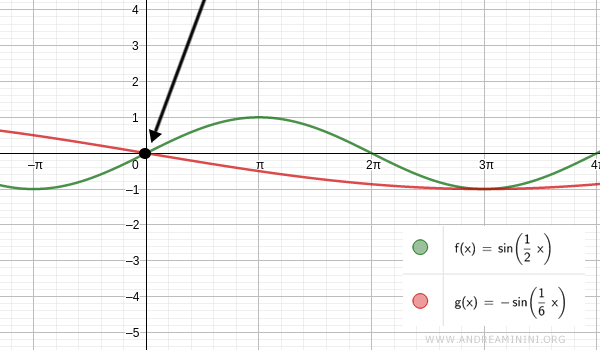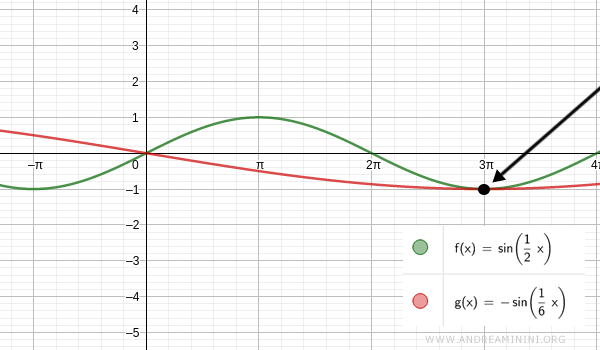Trigonometric Equation of the Form sin(α) = -sin(α')
The trigonometric equation $$ \sin \alpha = - \sin \alpha' $$ can be solved using the formula $$ \sin \alpha = \sin(- \alpha' ) $$, which leads to the solutions: $$ α = (-α') + 2k \pi \ ∨ \ α+(-α') = \pi + 2k \pi $$
Example
Let’s solve the trigonometric equation:
$$ \sin(\frac{1}{2}x) = - \sin(\frac{1}{6}x) $$
Since the sine function is an odd function, we can rewrite the equation by recognizing that -sin(1/6x) = sin(-1/6x):
$$ \sin(\frac{1}{2}x) = \sin(-\frac{1}{6}x) $$
This transforms the equation into the standard form sin(α) = sin(α'), where:
$$ \alpha = \frac{1}{2}x \\ \alpha' = -\frac{1}{6}x $$
Using the formula for solving sin(α) = sin(α'), we have:
$$ α = α' + 2k \pi \ ∨ \ α+α' = \pi + 2k \pi $$
Substituting the expressions for α and α', and isolating x, we obtain:
$$ \frac{1}{2}x = -\frac{1}{6}x + 2k \pi \ ∨ \ \frac{1}{2}x + (-\frac{1}{6}x) = \pi + 2k \pi $$
Simplifying:
$$ \frac{1}{2}x + \frac{1}{6}x = 2k \pi \ ∨ \ \frac{1}{2}x -\frac{1}{6}x = \pi + 2k \pi $$
$$ \frac{4}{6}x = 2k \pi \ ∨ \ \frac{2}{6}x = \pi + 2k \pi $$
$$ \frac{2}{3}x = 2k \pi \ ∨ \ \frac{1}{3}x = \pi + 2k \pi $$
Therefore:
$$ x = \frac{3}{2} \cdot 2k \pi \ ∨ \ x = 3 \cdot ( \pi + 2k \pi ) $$
$$ x = 3k \pi \ ∨ \ x = 3 \pi + 6k \pi $$
We have found an infinite number of solutions, where k is any integer (positive, negative, or zero).
Let’s examine the solutions for k=0:
$$ x = 3(0) \pi \ ∨ \ x = 3 \pi + 6(0) \pi $$
$$ x = 0 \ ∨ \ x = 3 \pi $$
When k=0, the trigonometric equation has two solutions: x=0 and x=3π.
The first solution, x=0, is straightforward:
$$ \sin(\frac{1}{2}x) = - \sin(\frac{1}{6}x) $$
$$ \sin(\frac{1}{2} \cdot 0) = - \sin(\frac{1}{6} \cdot 0) $$
$$ \sin(0) = \sin(0) $$
$$ 0 = 0 $$
This means the two functions are equal at the origin (x=0).

The second solution is x=3π:
$$ \sin(\frac{1}{2}x) = - \sin(\frac{1}{6}x) $$
$$ \sin(\frac{1}{2} \cdot 3 \pi) = - \sin(\frac{1}{6} \cdot 3 \pi) $$
$$ \sin(\frac{3}{2} \pi) = - \sin(\frac{1}{2} \pi) $$
$$ -1 = -1 $$
The two functions are also equal for x=3π.

All other infinite solutions can be found by substituting different integer values for k, such as k=-1, k=2, k=-2, k=3, and so on.
The Proof
The sine function is an odd function:
$$ \sin(-\gamma) = -\sin(\gamma) $$
Therefore, the trigonometric equation:
$$ \sin \alpha = -\sin(\alpha') $$
can be rewritten equivalently by replacing -sin(α') with sin(-α'):
$$ \sin \alpha = \sin(-\alpha') $$
This reduces the problem to solving a standard sin(α) = sin(α') equation:
$$ α = α' + 2k \pi \ ∨ \ α+α' = \pi + 2k \pi $$
Using the opposite angle -α':
$$ α = (-α') + 2k \pi \ ∨ \ α+(-α') = \pi + 2k \pi $$
And so on.
